
I did a bunch of these a few months ago, but other than this one, the others all eventually coalesced around a single theme. So I’m tossing this one out on its own, like an orphan.
(Yes, yes, I know, old meme. Nyah nyah nyah it’s fun.)
6
May

I did a bunch of these a few months ago, but other than this one, the others all eventually coalesced around a single theme. So I’m tossing this one out on its own, like an orphan.
(Yes, yes, I know, old meme. Nyah nyah nyah it’s fun.)
30
Apr
Superboy fucking Prime is the Time Trapper now?
Oh, Geoff Johns. Why you gotta make me hit you, Geoff Johns? Why you gotta make me do that?
Top comment: Punching reality?
That’s a paddling.
Being revealed as the Time Trapper?
You better believe that’s a paddling. — marvinmartian
30
Apr
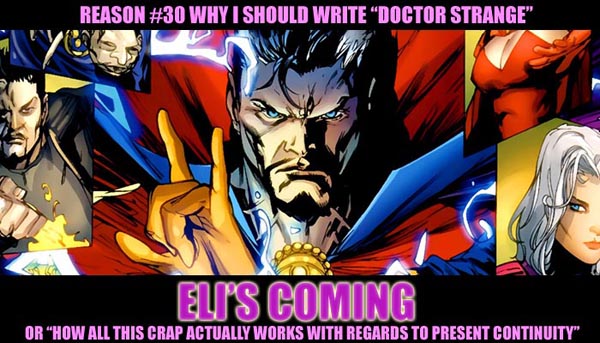
Pretty much from the start, emails and comments have appeared to the tune of “well this is all well and good but Dr. Strange isn’t the Sorcerer Supreme any more so everything you’re doing is meaningless.” And, as amusing as it is that people’s chief reason for dubbing this “meaningless” is that it does not necessarily follow current canon rather than the more pressing issue of it being unlikely that I will get paid moneys to write the comic any time soon, it’s still wrong. I mean, people, come on. You know I’m a continuity dork by now. I only mock Geoff Johns because he is so very like me in that he likes everything to fit when it’s possible to make things fit. And in this case the fix is really quite easy.
Pretty much from the first one of these things, I have been trying to gradually instill the idea that the chief plot point of the series is “majorly bad shit is coming down the pike.” And when I say bad shit, I mean seriously baaaaaaad shit, man. Shit that is bad enough that it scares Stephen Strange, who is very pointedly somebody who doesn’t get scared and doesn’t panic about much of anything.
(Additionally: I can sum up the reason for said bad shit coming down the pike in exactly three words.)
And when Strange saw what was coming, he knew what he had to do. He needs to work unfettered, without the constraints and day-to-day issues of the mortal world distracting him, but more importantly even than that, he needs to make sure said bad shit isn’t coming at him. The nice thing about being the Sorcerer Supreme is that you’re always the Sorcerer Supreme, until you’re not – but most people don’t understand that the job is attained in such a holistic manner. They think it’s a title of rank, or a privilege. They think it’s about having the Eye of Agamotto, the Cloak of Levitation and all the other trappings. (Which are nice, sure, but they don’t make you the Sorcerer Supreme.)
And he’s been preparing this for a long time, making sure that it was believable to any superhero who might think about investigating. (“Not being able” to use his magic to do simple things like save the New Avengers from a lousy crashing plane, for example.) He started downplaying his abilities more and more, making it seem more and more difficult – because the New Avengers, decent and brave as they might be, would be cannon fodder in what was coming, and he needed to make sure when it did in fact arrive that they were nowhere near the scene of the real fight.
And then he crowned all of this with his masterstroke – choosing a “new” Sorcerer Supreme.
Which actually worked something like this:
continue reading "“It isn’t calm before the storm. Stuff happens.”"
29
Apr
(People just kept mentioning them and mentioning them over and over again, and I kept thinking, “man when I get to #29 they are going to accuse me of pandering or plagiarism or something like that.”)
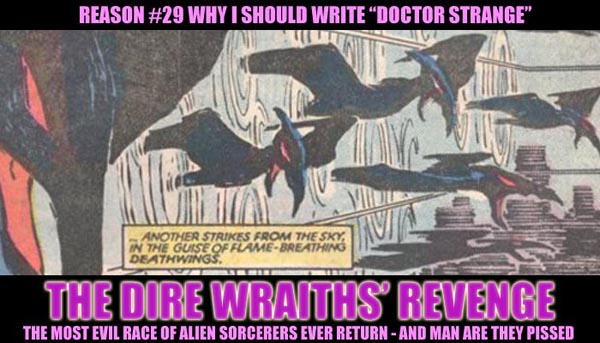
The Dire Wraiths hate you. It’s not personal. They hate everybody. But it also is personal because if they knew you, they’d hate you just because you’re you. The Dire Wraiths are not very nice people.
But they don’t hate you blindly. They have reasons for hating you. You’re a human, and humans – along with ROM – are of course the reason the Dire Wraiths went from being one of the most feared races in the galaxy to a collection of suicidal prisoners in Limbo. Most of the Dire Wraith population is dead because of humans (and ROM). The Dire Wraiths don’t want to conquer the humans; they want to exterminate them and make them suffer. And they want to do it before they go to Galador, because the Dire Wraiths want to keep enough humans alive as hostages that the Galadorians won’t try to pre-emptively annihilate them.
And here’s the thing: the Dire Wraiths are much, much smarter than their Skrull cousins. They know how to pull off an actual secret invasion. They’ve done it before, you see. And unlike the Skrulls they don’t need to take out and replace superhumans. The Dire Wraiths know that messing with superheroes in any amount just tips them off. The Dire Wraiths are once again just doing what they do best – they’ve infiltrated a small town in middle America that’s nothing special – except for a few key elements it happens to be near. Chief among these are a high-tech research facility specializing in solar energy transformation technologies and a weatherbeaten steppe with inherent mystical properties…
…because the Dire Wraiths, this time, are led by a prodigy Dire Wraith, verily the Dr. Doom of Dire Wraiths in that, unlike the rest of his species, she possessed both incredible skill with Dire Wraith super-science and Dire Wraith sorcery.
“But wait,” some continuity nerd out there says, “the Dire Wraiths lost their magic abilities when ROM transported Wraithworld into Limbo.” And this is true. However, this fugitive Dire Wraith, one of the scant few dozen to escape ROM’s massive neutralizer attack on Wraithworld and only a child at the time, applied her scientific mind to the Wraiths’ lack of magical power source and came up with a very simple solution: hire out.
Someone – something – has given the Dire Wraiths magic again. And frankly, it’s more powerful by far than the podunk, pedestrian sorcery they worked before; now, Dire Wraith sorcery is powerful enough that when they use it, someone like Dr. Strange notices. (It is, after all, his job.) And they’ve got a direct line to whomever’s providing them with mojo; the magics they wield are so powerful that they are literally burning out their own bodies when they use them. But they’ve got enough magic now that they can pull Wraiths out of Limbo, and more Wraiths join their numbers every day, and they don’t care how many of them die –
– because if they can convert Earth’s sun into the new dark sun of the Wraiths, with science and sorcery, they win. Even if every Dire Wraith was immediately afterwards killed (which would be entirely possible because nobody likes the Dire Wraiths), they would forever have left their mark once more on the universe.
All of this begs two major questions. Firstly – who’s powering the Wraiths? For my money, I’d guess that it’s someone who somehow gains power from their magic-fueled deaths, which means it’s probably someone really bad. Cthon? Mephisto? Satannish? (You just know that whatever the answer is, it’s not going to be good.)
And second – given that Marvel Comics can’t show ROM in his armor, how is ROM going to get involved in this, anyway? Because you totally know he will.
Top comment: Like Naked Snake and Naked Jehuty before him, Naked Rom shall be a powerful, yet wholly unstable force to be reckoned with. — Doctor Hal
28
Apr
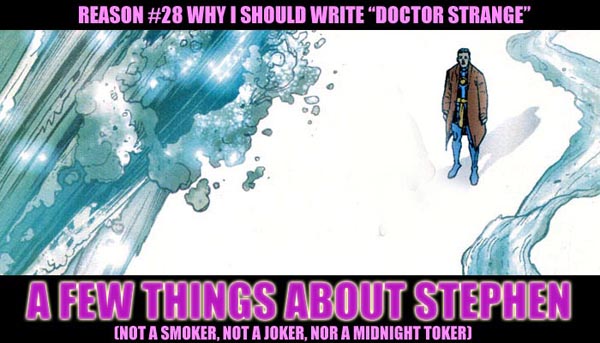
THINGS YOU SHOULD KNOW ABOUT DOCTOR STRANGE.
1.) He is polite. Not just because he routinely deals with impossibly powerful forces whom he does not want to offend (although that is certainly part of it); Stephen Strange is polite because at his core he is a man who has been humbled. He was an arrogant misanthrope who realized exactly what he was and decided he didn’t like that, and did his best to change. Someone like that is polite because not being polite is exactly the opposite of the person they want to be.
2.) But he’s still a doctor. He tends to think he knows best. This is because usually (although not always, not by any stretch) he does know best, and he gets irritated when people don’t do as he tells them to do (which is often). Because he’s polite, he tries not to get angry about it. Usually he succeeds. But none of this changes the fact that he decides courses of action based on knowledge and observation first and foremost, and he doesn’t like being contradicted or shown up, and he’s really, really quick to issue orders whenever he needs something done. He might apologize later, but he’ll issue them.
3.) He likes people. He didn’t always, but nowadays meeting somebody new is always a pleasant experience for him, especially when they are not trying to blow up his face with magic. He genuinely enjoys the experience of a new personality, because people are the only things in this universe that are still capable of surprising him on a regular basis, and because Sorcerer Supremes, for all that they are guardians of stability and order, like to be surprised. It makes the job a lot more bearable.
4.) But he’s not really comfortable with them. How could he be? He can stop somebody’s heart just by thinking hard, for crissake; he’s a step above most of humanity (or, really, a few flights of stairs above) and he knows it. He’s not comfortable with that fact, not in the least; he doesn’t like the idea that he’s not just a normal man, especially after the Ancient One only really got him to start learning by forcing him to accept that he was precisely that very thing. His power is vast enough that he’s on par with most demigods; it’s hard to look people in the eye when you realize that fact and aren’t quite happy with it.
5.) He’s urbane and blase. Not in the way of a jaded hipster, but – not a whole lot surprises or shocks him. He’s been exposed to so many alien cultures (dimensionally alien, spatially alien, or any other sort of alien) that dealing with a species of incestuous cannibals wouldn’t faze him in the least. (Or, if you prefer: everybody is a bastard in their own way.) Tack on the combat with otherworldly horrors, and you have a very cool customer. When other superheroes wince or gag at a brutal murder, Doc is looking over it calmly and utterly unfazed. He’s what writers wish Wolverine actually was, except Doc has to deal with the actual alienating consequences of being that sort of person.
6.) He’s a bit eccentric. He puts peanut butter on his spaghetti because that’s how they do it on Earth-2991 and when he visited he got used to it. He prefers to read crosslegged sitting on the ceiling because “you don’t get that glare you get sitting on the floor in the sun, I hate that.” He asks seemingly rhetorical questions without answering them (something that annoys the hell out of Wong, not that Wong would ever complain). He enjoys listening to reggae as performed on the harpsichord. The downside of thinking as everything as “usual” is that everything else you might like is likely not that usual.
7.) He looks at the bigger picture. Sure, he doesn’t want Earth to be conquered by Skrulls, but if it’s a choice between Skrulls and Dormammu – Skrulls. If it’s a choice between Skrulls and Nightmare – Skrulls. He knows it’s important to keep humanity alive and healthy for a number of very important reasons, but “alive and healthy” doesn’t mean “dominant civilization on the planet.” Most other superheroes get angry over this. That’s fine – most other superheroes only have to fight idiots wearing tights who rob the occasional bank, as opposed to, say, an organ-eating Prince of the Frankensteins from an alternate Earth seeking to conquer under the guise of a trading mission. Strange’s enemies are, on the whole, a lot more competent and a lot more dangerous than average. So he has to consider his duties from that standpoint first.
Top comment: At first I winced at Peanut-Butter spaghetti but upon thinking, if it was a peanut sauce then it wouldn’t be *too* far from Thai peanut sauce, which all the universe loves, and it’s an easy step to grill chicken in it and then put it over cooked noodles, which would be very tasty.
I think MGK just created a new fusion dish. — The Whelk
27
Apr
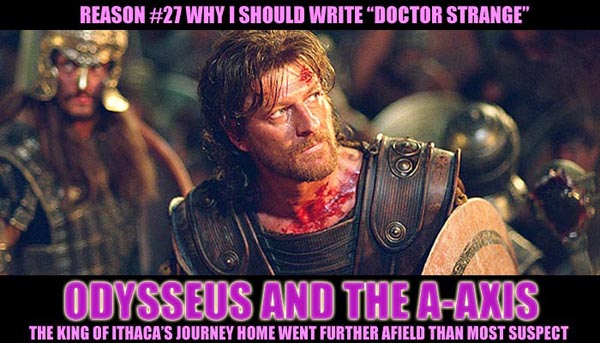
Homer made up a lot of stuff, mostly because he worked from unreliable sources.
Odysseus’ journey home, from the smoking ruins of Troy to Ithaca, did indeed last ten years. Or seventeen, depending on how you count it. See, if you just count from the time he left Troy to the time he arrived in Ithaca, it was ten years. But if you count the time as Odysseus experienced it, it’s seventeen years, because what Homer doesn’t mention is that Poseidon wasn’t the only god Odysseus managed to piss off.
Odysseus counselled the Argives to slaughter Hector’s young son, so that the child could not grow up to avenge his father and his city. This greatly angered Khronos, the god of time and destiny, who had written out the life of that young boy in advance and who greatly resented Odysseus for using free will to avert what would have become known as the Second Trojan War. Khronos was extremely irritated, but decided not to intervene on the course of Odysseus’ life.
When Odysseus set out from Troy, after he met up with the Lotus Eaters and the one-eyed giant Polyphemus, he stayed briefly with Aeolus, the man gifted with the power to control the winds, and left with a bag of wind that would blow him anywhere except home. Poseidon would not stop complaining about how this annoying mortal was thwarting all the challenges put before him, and Khronos explained to his fellow god that – if Poseidon owed him a favour – he might be able to help. Odysseus was destined to return home, ten years after the end of the Trojan War, and Khronos wanted to be sure that happened…
And so, Odysseus told the poets and storytellers that his crew stole the bag and blew his fleet off course. But that never happened. What happened was this: Khronos transported Odysseus’ entire fleet to a watery planet of carnivorous aliens called the Laestri. Odysseus immediately understood that they were in a different sea (by the stars, you see), and his crews insisted on putting in at port as soon as possible. He ordered his crew to hang back, which was a good idea because the Laestri weren’t particularly picky about what they ate and they devoured the rest of the fleet pretty quickly, seeing as how they were a starfaring race with all the technological prowess that implies.
But this wasn’t any regular old boat captain marooned on an alien world – this was Odysseus, one of the most cunning and wily men to ever live in any time period. He snuck aboard land, hid in ventilation ducts, and taught himself Laestrian over about three weeks. He didn’t understand all the technical specifics, of course, but he found out where the Laestrians kept their theoretical physics experiment installation was easily enough when he figured out the words for “time” and “travel.” (It never occurred to him that he wasn’t on Earth; he figured it was a far future where the Lamia had conquered the world.) As he sailed his remaining ship to that point, Khronos appeared and transported it to another strange sea on another world.
And so it went; whenever Odysseus got to a point where it seemed likely that he would thwart Khronos’ wiles, the God of Time would send him elsewhere. And it was always possible that Odysseus could get home from where he was, because Khronos has his own set of rules, and one of them is that he likes things to go a Certain Way. It just never happened, because Khronos wanted to punish Odysseus for his insolence – and, ultimately, for possessing free will. Khronos was determined to make sure that Odysseus would only arrive at Ithaca when he wanted Odysseus to arrive there. Odysseus’ crew are all long since dead; he sails his ship alone, with a thousand stolen technologies he only partially understands (but partially is enough).
But Khronos made one mistake. One time, to really, really get under Odysseus’ skin, he transported Odysseus to Ithaca – thirty years after he made it there, so that Odysseus could arrive to visit Penelope’s grave. And Odysseus saw it, and Khronos gloated at his captive’s pain, then turned his attentions elsewhere –
– and Odysseus was waiting for just that moment. Not the Odysseus weeping before his wife’s grave. The other Odysseus, the one who had already made it home after all the torments of a seventeen year journey, the one who had lived with his beloved Penelope another twenty-seven years before her passing. The older Odysseus had been waiting decades for this (and lying to anybody who would listen about Circe and Calypso and the Sirens and all the other hot women he totally could have bagged if he wanted to, but he didn’t because he loved his lady), because he already knew it would happen – and he told his younger self how to get home.
And now – a couple of dozen or hundred pit-stops later – Odysseus arrives in the modern day. (Somewhere off Cape Horn, actually.) He knows exactly what to do. He makes a beeline for New York City, where the Sorcerer Supreme makes his abode. Because only Dr. Strange can end his journey, and send him back to Ancient Greece where he belongs, for once and for all. He needs the really good magic to get home.
Top comment: I like the idea that Odysseus is still pulling the Trojan Horse bit. Like, he’s been to countless exotic worlds but they’ve pretty much all bought it so he thinks it’s like the be-all end-all infiltration tactic.
Especially if he has time to go on a couple adventures with Strange before he leaves.
“How shall we effect entry into Doom’s castle? It’s magically warded and patrolled by robots with killsaws for hands and murderguns for eyes!”
“Let’s build a giant wooden -”
“No.”
Double points when Strange realizes that Doom would absolutely not turn down a giant wooden statue of himself. — Five Eyes
26
Apr
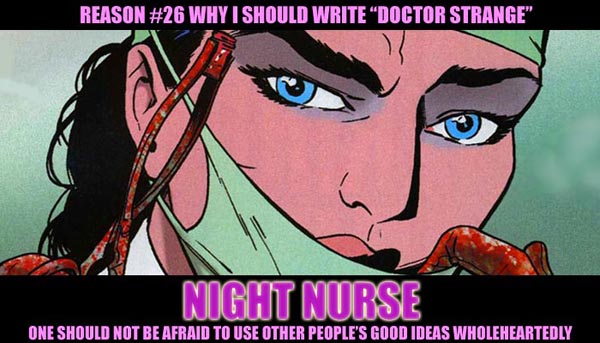
A while back, somebody asked when I was going to talk about Clea. And my response was “they’re over.” Because Clea, although she is most certainly Stephen Strange’s most notable and notorious love affair, belongs in Strange’s past (at least romantically – she’s still a powerful sorceress and good friend). They were good for one another at the time, but there’s too much water under the bridge now to get back together, regardless of how sexy a platinum blonde she might be. The “bring back Clea” crowd is one motivated by little more than nostalgia, and I think by now people know what I think about nostalgia for nostalgia’s sake. (HINT: I am not fond of it.)
However, there’s no reason Strange shouldn’t have a lady friend. He’s an urbane, dapper sort of fellow, the sort who in times past would be called a “real gent.” Men like that (when they are straight) can do quite well with a certain sort of woman who likes her men smart and talented (in more ways than one). And luckily, Brian K. Vaughan was good enough to kickstart a relationship between Dr. Strange and Night Nurse (who, as we all know, should properly be called “Night General Practitioner And Surgeon” but that was too long and didn’t fit on the business cards).
And it works. Night Nurse is tough and intelligent, and definitely older than the average Marvel Comics Girlfriend ™ and she can use a bobby pin to pick a lock and cut a bullet out of someone’s shoulder and all of this is just great. She is a class act who fits Strange well – they’ve both been around the block a bit and are both ready for that easier, simpler sort of relationship one only gets in one’s forties or later, the type where nobody has any patience for drama so nobody wants to create some.
Similarly, from a storytelling perspective, Night Nurse is a great fit because she is a classic explanatory/exposition target. If a writer needs to explain why magic can’t do something Strange needs to do, Night Nurse is right there – she’s smart but unlike most people in Strange’s world she’s not familiar with all the rules. And apart from being a storytelling tool, it can also be a plot hook –
– because sometimes, in the right situation, ignorance of the kind that Night Nurse has is actually the greatest protection you can have against the Eldritch Horrors From Wherever. Not being privy to the secrets of the occult world means that the secrets of the occult world will tend to overlook you. Not having to pay attention to the ebbs and flows of magical tides means that you get the chance to pay attention to that strange man in the nondescript Honda parked down the block who’s been staring at your friends for twenty minutes.
(And yes, most of this also applies to Wong – but come on, was there ever more natural a teamup than Wong and Night Nurse? I think not.)
Top comment: Someone should follow Matt Murdock around saying to every woman he meets “Do not date this man. You will end up insane or, more likely, end up in a pine box.” — Lister Sage
25
Apr
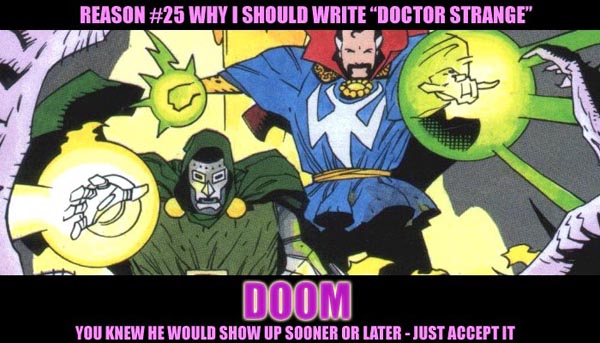
Doctor Doom plays a different role in any potential Doctor Strange comic than he does just about anywhere else.
In an issue of Fantastic Four, if Doom shows up, he is inevitably the antagonist. In an issue of Spider-Man, he is almost always the antagonist. In Avengers, antagonist. If he ever shows up in an X-Men comic – antagonist. When he’s not the antagonist, his presence is just about always a MacGuffin instead. And this is fine and good. Doom is a bad guy. He should be the antagonist.
But in Doctor Strange’s world, Doom isn’t necessarily the antagonist. He can be, but the thing about Doctor Strange is that, when it comes down to magic, he’s inevitably superior to Doom. Doom’s not bad by any means – really, he’s impressively powerful in a magical sense – but his desire to master both science and magic means that his magic will always be weaker than Strange’s. (But it doesn’t necessarily mean that his science will always be weaker than Reed Richards’ science. This is one of the ways magic is slightly different from science.) Doom’s entire character makes him often unsuited to be an antagonist for Strange, because in a battle between the two, Doom is almost always attacking at a disadvantage, and Doctor Doom doesn’t do that when it’s possible.
Plus, Doom doesn’t really have any reason to be an antagonist for Strange. Most of the time, anyway. Certainly Doom’s ever-present power lust is always going to be cause for potential strife. But he doesn’t dislike Stephen Strange particularly, not like he hates the Fantastic Four or doesn’t understand the motivations of Captain America. Stephen Strange makes perfect sense to Doom: a man who sought mystical power and got it, and who protects his home turf from outward threats. Of course, there’s more to Strange than that, but it doesn’t matter because what Doom sees, Doom understands. Everything else is just window dressing.
This means that Doom is a relative rarity in Doctor Strange stories; he’s a true wild card. Not like Baron Mordo, who on their rare team-up occasions inevitably would turn on Stephen the moment it seemed convenient. If Doom throws in with Strange, he will (mostly) throw in with Strange for real. But there’s no guarantee that he will throw in with Strange, because it’s entirely possible that Strange’s goals will stand in sharp relief to Doom’s.
Which means that when Doctor Doom shows up in a Stephen Strange story, you get a novel experience not normally associated with Doctor Doom: you don’t necessarily know why he’s there or what he’s going to do. And that’s valuable.
Top comment: Just looking at the artwork MGK chose for this post makes me wonder: When did Doctor Strange sport a “Meathead” mustache, and why isn’t Doom mocking him for it? — ps238principal
24
Apr
(NOTE: Brad Reed originally submitted this idea to me a couple weeks back, and I liked it so much that I removed one of mine to make room for it, because it’s nifty. I tweaked it a bit, but this is still mostly Brad’s.)
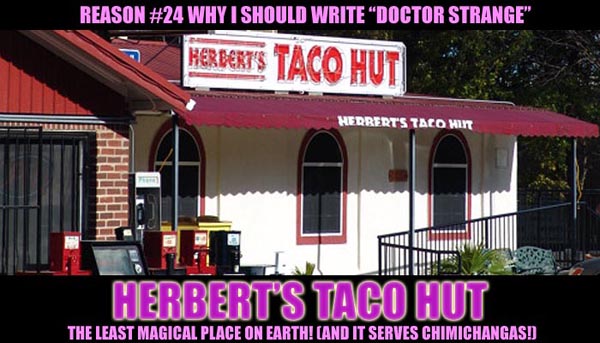
The reasoning is simple: you all know about ley lines, right? And how in popular fiction where there is magic, there are inevitably places where lots of these ley lines meet up, and that’s where magic becomes more powerful and spells have more oomph and faeries still walk the Earth and occasionally go to McDonald’s (redcaps love Big Macs for some reason) and children born in the area become Mystic Defenders or the like?
Well, it follows that if there are supermagical places where the ley lines converge, then there must also be submagical places where the ley lines are way the hell off on the horizon. These are the Boring Places, where magic is mostly absent. Children born here grow up to become accountants, chiefs of human resources and the boring kind of scientist who sniffs at MythBusters because they make jokes and such. In these areas, magic is especially hard to do. Not impossible – but difficult, because you’re martialling the energy of the universe at a distance. It’s like you’re used to broadband and suddenly you’re back using 24K dialup.
The most boring of all places – the single least magical place on Earth – is a small town in New Jersey, twenty minutes from of Newark. And the least magical place within that town is Herbert’s Taco Hut, which if it were not for its location would be your standard “Mexican restaurant run by white people who have never seen a chili pepper in their lives” joint. It should have had the lifespan of any other mediocre restaurant in the middle of nowhere (IE, short). But Herbert’s does very good business indeed, for one simple reason:
It’s where sorcerers and mages come to do business. Because it’s safe. Herbert’s is the magical equivalent of an old Wild West township, where you have to check your six-guns with the sheriff when you enter. Most sorcerers can muster a simple teleportation spell for a quick escape from it if necessary (and those that can’t can prepare something similar in advance) but not much else. SHIELD and HYDRA and everybody else all know about it, but nobody ever tries to fuck with Herbert’s because having a neutral ground (which happens to serve mediocre burritos) is inherently a useful thing to have at one’s disposition.
And because of this, it’s not only a place to do business, but a place to network, to chat, to simply unwind and shoot the shit with one’s fellow magical practitioners. After all, the food isn’t that bad, and they let you bring your own booze for a small surcharge (and you’ll want to, because their beer selection is terrible), and how is anybody going to know that you just stole the fabled Red Ruby of Un’nx if you don’t have someplace to show it off? Plus, it offers the best grounds on the planet for picking up within the profession. (There is no guarantee that the person you take home won’t try to sacrifice you to a demon prince – but come on, you think magicians are going to give up sex?)
And yes, Stephen Strange goes there occasionally. Because he has to make appearances, keep tabs on goings-on, keep his ear to the ground – and because it’s nice, every once in a while, to take off the mantle of “world’s most powerful sorcerer” for an hour or two and just tuck into some nachos.
Top comment: While we’re mentioning ley lines, can we get a story where Dr. Strange investigates Disney World to see if it truly is ‘the most magical place on Earth’?
I’m partly interested to see the mysterious origin of Walt Disney’s occult practices, but I mostly just wanna see Dr. Strange ride the tea cups. — RobotKeaton
23
Apr
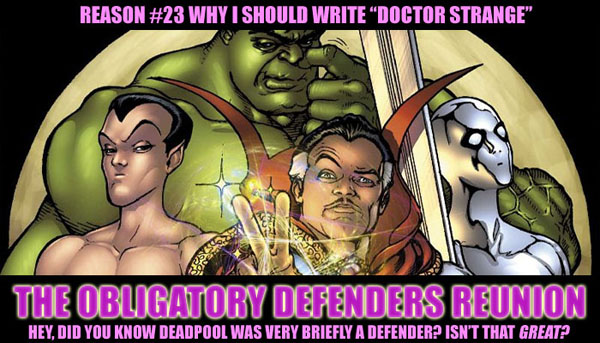
The setup is simple: Something Bad Happens. Something that is so bad, Dr. Strange heeds an impulse he normally ignores: to call in backup.
Now, his instincts say “call in the Defenders.” The Hulk, the Silver Surfer and the Sub-Mariner aren’t his friends, not really. And they’re barely even a team. So he heeds his better judgement as well, and relies upon the visions provided to him by Hoary Hoggoth himself to pierce the mists of time. Time is, after all, only an illusion sentient beings create in order to keep from experiencing everything at once, and possibly exploding in the process. Magic is quite useful at navigating time. At least to a certain extent.
Unfortunately, Dr. Strange is a bit rushed in his casting of the spell, because, you know, Something Bad Is Happening (Right Now). So he doesn’t try to determine specific outcomes, because that would take multiple castings of a very complex temporal rite and he doesn’t have that kind of time. (Plus casting the spell needs a tincture of Skryian chmrr-venom, and he doesn’t have a lot of that lying around.) All he really has time to ask is one question:
“Which of the Defenders will I need assisting me in order to prevent this devastation?”
Of course, he asks the question because he wants to make sure that calling in the Defenders is the right thing to do – and yes, he probably should have considered asking about the Avengers or the X-Men or the Initiative or the Guardians of the Galaxy or whoever while he was at it, but come on, he’s not perfect and sometimes when you’re in a hurry you get a tiny bit sloppy. And in fairness, he at least knows now that calling in the Defenders will work. Somehow, there is the potential for it to work.
But here’s the thing. There have been a lot of Defenders. And although he was probably thinking of the Hulk, Namor and Surfer…
…maybe he gets Deadpool, Gargoyle, Sleepwalker and Tagak the Leopard Lord.
…maybe he gets Deadpool, Blazing Skull, Charlie-27 and Captain Ultra.
…maybe he gets all villains, from the shortlived villainous incarnation of the Defenders: Batroc, Blob, Whirlwind and Electro. (And Deadpool.)
…maybe he gets Devil-Slayer and Daimon Hellstrom, who immediately try to kill each other while Deadpool provides commentary.
…maybe he gets a team that’s entirely dead: Thunderstrike, Porcupine, Torpedo and Jack of Hearts. And I mean “dead,” not “reanimated to come save the world.” He casts the spell and finds out everybody he needs to save the world is deader than Elvis. Also he gets Deadpool, who is not dead, although after about ten minutes Dr. Strange will probably wish Deadpool was dead.
…maybe he gets Luke Cage, Spider-Man, Iron Fist and Hawkeye (Clint Barton, not Bullseye), and has to explain what he’s actually doing when he’s not supposed to be the Sorcerer Supreme any more. Which is harder than it looks when you’ve got Deadpool hanging around asking all sorts of inappropriate questions.
…maybe he gets Daredevil, Hellcat, Paladin and Nighthawk (and Deadpool), and has to figure out how a bunch of people who don’t have any powers are going to help him save the world. Well, sure, you can shoot Deadpool a lot and he’ll live, but that’s not exactly proactive, you know?
Really, it could be anybody. The only certainty is you know that Deadpool will be involved somehow, because that’s just too good a chance to pass up. And maybe, just possibly, at some point the Hulk, Namor and Silver Surfer will show up anyway. (“Seriously, Strange. What possessed you to go fetch Joe the Gorilla but ignore the Avenging Son? Not that I don’t appreciate you respecting my privacy, but surely you must have gone insane at some – SOMEBODY SILENCE THIS NATTERING IDIOT IN THE BODY-STOCKING!”)
Top comment: A bunch of awesome-but-underused characters join forces to kick ass while their conflicting personalities provide humorous dialog? THIS IS SUCH A NOVEL IDEA! — NCallahan
22
Apr
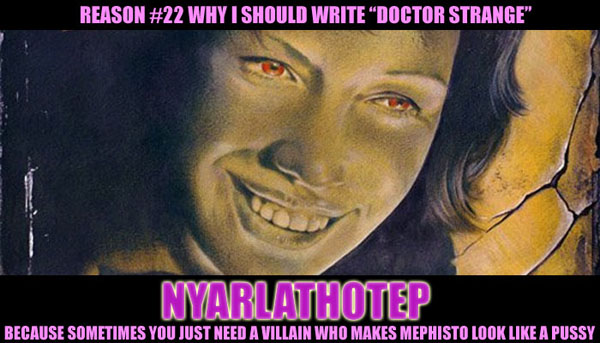
At his essence, Dr. Strange is a reactive hero. There is nothing wrong with this. Sometimes comic writers get tired of “reactive” and want to write heroes who proactively take on super-evil and what have you, and it can work for a little while if you set it up properly (Abnett and Lanning are doing a good job with the premise in Guardians of the Galaxy by having the heroes’ “proactiveness” actually be an extended mission in disguise). But reactivity is generally to the good because our system of justice is ultimately reactive as well. Reactively, we maintain order. Strange preserves order in this sense.
Dr. Strange’s major villains, though, aren’t really opposite forces of order, not in that sense. Dormammu and Nightmare want to conquer, but they would remove our system of order and replace it with their own version (which might not be nice, but it’s still generally orderly). Mephisto wants to use our system to feed his own ends. Baron Mordo just wanted to become powerful and important. All of these guys fundamentally weren’t villains who were trying to tear things down.
Which brings me to Nyarlathotep1 and his opposition to Strange. Nyarlathotep isn’t like Dormmamu or Nightmare; he doesn’t want to conquer. (He might occasionally conquer a place, but he doesn’t really care.) He’s not like Mephisto; he doesn’t want greater power. (He has plenty.) Nyarlathotep is just a sadist, pure and simple: he gets his pleasure from driving people mad and causing pain and suffering (preferably emotional pain and suffering). He’s a psychopathic god who doesn’t get cocky and make mistakes, except when he wants to make mistakes. After all, what fun is it if you can’t at least offer Strange the opportunity to stop you?
Nyarlathotep is much like a gambler in this respect; he gets his kicks from the thrill ride, from the chance that maybe his schemes won’t work. (It’s no fun going fishing if the fish just jump into the boat, after all. You want them to fight you on the line.) And the Sorcerers Supreme of Earth have very frequently proven tough enough opposition that Nyarlathotep has been forced to up his game significantly, which means he just has to go out and do the psychopathic god-equivalent of buying a really good fishing pole. He plans his schemes out years in advance now, and when it’s about to drop everything into the crapper, that’s when he knocks on Stephen Strange’s door, grins his youthful grin that any unknowing onlooker would call “full of zest for life,” and sits back to watch.
Of course, Nyarlathotep’s downfall is that he has a bit of an ego. He never really considers that the Sorcerers Supreme started predicting his manipulations centuries ago, or that they’ve gotten better at doing it over time. And he’s never really considered that just maybe, one of their long-term projects has been figuring out how to destroy him…
Top comment: That looks exactly like my high school yearbook photo.
Creepy. — Rian Fike
21
Apr
Science tells us that the earth is six billion years old, formed from a clump of dust which coalesced into a solid planetoid where water eventually formed and amino acids and electricity created the spark of life. An old shaman will tell you that the world was created when Turtle pushed some dirt onto his back to cool down, then splashed some water on it by accident. And the Sorcerer Supreme will tell you that the key to understanding magic is that these two stories are both true, despite their obvious contradictory nature.
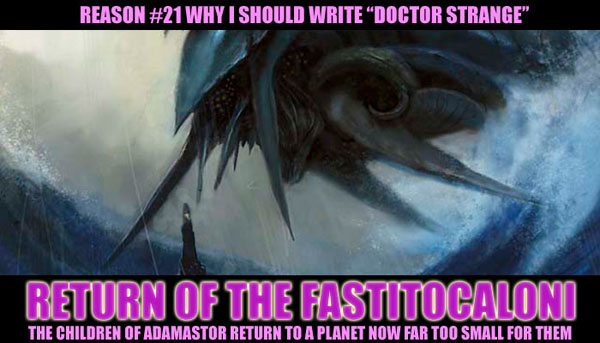
They had names for them in the old days: “leviathan,” “aspidochelone,” “tarrasque,” jasconius,” “turisas,” “yacomama,” the Rainbow Fish, the Jormungandr and the Hydra. There were of course other monsters who had those names, but the fastitocoloni were mistaken for all of them at one point or another. When the great beasts of the sea had back-itches, they would rub up against undersea cliffs and push them upwards, creating hills and mountains where there was previously only flat land. When they played with one another in the ocean, they created tsunami. One time, when a lunatic human successfully hunted one of them, the corpse floated out to a part of the ocean that was empty, and it eventually became Greenland.
Eventually they all disappeared and life grew a little duller. People invented interesting things that made the world a smaller place – tall ships, telegraphs, digital watches, the Internet, that sort of thing. The hidden corners of the world grew fewer and fewer, and certainly there were no places remaining where the legendary sea monsters might still lurk.
Which is why it’s awfully surprising when a group of five fastitocoloni surface near Okinawa for a few minutes – causing a tidal wave that causes billions of dollars in damages to a good chunk of the Pacific Rim. They’re even larger than they were in olden times – the smallest one is the size of Manhattan Island! – and when it becomes clear that they’re real everybody starts to panic. Especially when it becomes clear they’re headed for major fish populations, and it looks like these big boys’ idea of a light snack would probably drive more than a few major species of fish to extinction. The world’s gotten too small for the leviathans.
Killing them is difficult enough (as many armed forces soon discover), but would Doctor Strange want to kill them if he could herd them offworld instead? After all, they’re not trying to hurt anybody. Really, they’re quite peaceful as giant sea monsters go. Surely if they left Earth once, they could do it again, right?
Of course, that in turn begs the question: where did they go? And where did they come back from? Was it the same place? And how did they get here? And was it just a fluke, an accident, or did somebody do this on purpose? And how do you get them to leave?
Top comment: Well, from the art you used on this entry, I say Dr. Strange taps one blue for an Unsummon spell. — malakim2099
20
Apr
Something that has been cropping up in the comments every so often is the observation that most of these posts are, thus far, “dude-centric,” and there are no female characters being mentioned and so on and so forth. And the thing of it is that when I think about how to write Doctor Strange, this is far from the case.1 It’s just that once again the pre-arranged nature of these posts means that sometimes I’m not anticipating potential reader needs (even as regards what’s essentially just a series of loosely constructed, unfinished pitches) as well as I would like.
But rest assured that out of all the ideas I’ve put forward so far, this is my favorite – the last of Strange’s three “interns,” and I personally think it’s the strongest. Sir Humphrey and Creaky are entertaining and interesting, and that’s valuable for supporting cast members, but I think this has more meat on the bone, so to speak.
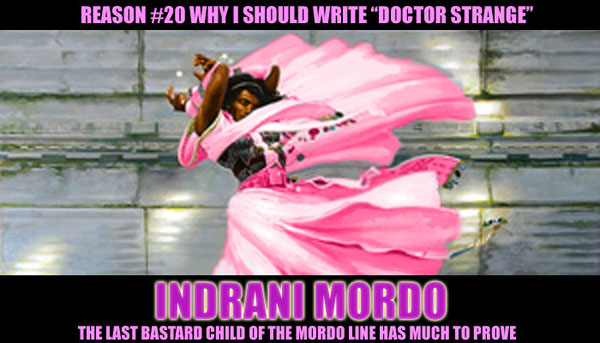
First off, before we go any further: Baron Karl Amadeus Mordo is dead. He is dead. Conslusively so. After a long, mostly bad life, he died trying to atone for his sins, both in the general sense and specifically those he committed against Stephen Strange, a man who once his great friend. Astrid Mordo, his daughter, is also (very probably) dead. And Astrid, who was crazy as sin and evil as the Devil, killed everybody else on the planet with Mordo blood in their veins, so determined was she to become the sole remaining Mordo in the world.
Well. Almost everybody.
See, Karl Mordo had many personal failings, and one of them was a tendency to dog the ladies as much as possible. Luckily, out of all the potential bastard offspring he ever could have had, in the end he sired only two – Astrid, and Indrani, his daughter by a Dalit prostitute in Chennai. From a very early age, Indrani knew two things: she was in a very bad position, lifewise, and that she could do real magic. The Brahmin sorcerer-circles in India – steeped in tradition and privilege – frowned upon the lower castes doing magic, to say the least, so she could not find a teacher. Not that this was her primary worry at the time, for her mother died when she was six, stabbed by one of her clients, and Indrani found herself on the streets – and young girls usually don’t last long on the streets.
But Indrani survived, partially because of her nascent magical abilities and partially because she was in many ways the human personification of “no, fuck you,” and she taught herself whatever she could whenever she could. She stole money and food, learned English and eventually went abroad, where she found out that every other mage on the planet was just as unwilling to deal with her as the mystics in India were. Of course, this had nothing to do with caste; it had everything to do with her being a Mordo.
Karl spent a lifetime ruining his reputation in Earth’s mystical community, and Astrid’s short but utterly psychotic career destroyed whatever remaining goodwill might have existed towards the name in the first place. (Most of the other Mordos Astrid killed weren’t really prizewinners either. Karl Mordo did not come from a particularly humane or idealistic family, which explains a lot about him.) And Indrani’s noteworthy temper didn’t help her overcome that reputation, to say the least. Nobody was willing to risk teaching “another goddamned Mordo” one single thing about magic.
Nobody, that is, except for Stephen Strange.
Stephen looked at Indrani and saw the raw talent, of course, and he saw the driving ambition and fierce pride that were both hallmarks of Karl Mordo’s personality. But he also saw Indrani’s capability for compassion, the sort that a lifetime of hardship can provide like little else. He wanted to preserve that, to nurture it. And there’s something else, not that he’d ever admit it or even realize it.
See, Stephen Strange is a man who found himself comparatively late in life, thanks primarily to the Ancient One knocking a lot of sense into him. He grew into adulthood believing that children were a bother, that he didn’t want children, that he didn’t want to be a father – and of course part of this was his firm belief that he would make a poor parent, a facet of his deep self-loathing. It comes as a bit of a shock, then, in your late forties when you’re pretty much a confirmed bachelor, to suddenly realize that you would have liked to be a father. And by that point it was too late – not just because it’s a bit late in the game to start thinking about a family, but by then he knew he was on track to become Earth’s next mystic defender, and having children would be a callously irresponsible act given the threats to their safety and the possibility – no, make that likelihood – that he might orphan them.
So he mostly put that idle wish of how things could have been aside and forgot about it. And that was fine. But along comes this walking bottle of spit and vinegar, the daughter of a man he once called brother. (Good heavens, she’s practically his niece!) It would be irresponsible not to make sure she learned what she needed to know – and after grasping her mystic potential, that becomes all the more important, because Indrani’s native ability is definitely on the high end of the scals (much like her father’s – and Stephen’s, for that matter). So it’s clearly necessary.
Right?
Top comment: If I complain that there aren’t enough kittens in your ideas, will that get me a kitten story? Because you are completely (and chauvinistically? eh? eh?) lacking a kitten point of view here, buddy. — Cookie McCool
19
Apr
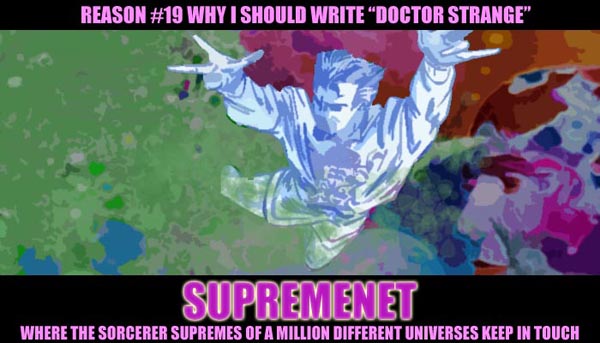
There are Sorcerers Supreme in every parallel universe. Sooner or later, one of them would eventually decide that contacting other universes for advice or information would prove useful. That’s what the Supremenet is for.
Of course, calling it the “Supremenet” conjures up the expectations that come with all things internetty, which is why most Sorcerers Supreme – including the 616 version of Doctor Strange – will strongly try to discourage anybody from calling it that. This isn’t email or instant-messaging or a chatroom. Magic doesn’t quite work that way, especially when it’s trying to bridge dimensional barriers. The closest analogue is the “party line” back in the early days of the telephone, when all the ladies in town would share a single phone line and gossip, but sometimes your connection to that line would be shaky or staticky and sometimes you’d get connected somewhere else. Combine that with difficulties of magical communication that are Olympian in scale and – well, it’s not Google.
The Supremenet rituals were created by a Stephen Strange – not ours, but the Stephen Strange of universe-82432, the universe that was utterly destroyed by that reality’s Korvac. That Stephen Strange, along with his reality’s Silver Surfer and Jean Grey, were exiled from it by Korvac before he condemned everything else in that universe to oblivion, and that Strange determined that this could not be allowed to happen again. He maintains the Supremenet with the assistance of Jean’s telepathic abilities (her connection to the Phoenix Force lost forever with the death of her reality) and the Surfer’s Power Cosmic. That it works at all is testament to their skill.
Unfortunately, he can’t monitor how the various Sorcerers Supreme use it. This is problematic, because as noted previously, not all Sorcerers Supreme are good guys. Some are bastards. Some are dimensional pirates. Some fancy themselves multiversal conquerors. And of course there’s the problem of the Marvel Zombies zombie virus, which isn’t transmissible through the Supremenet, but you never know if the Sorcerer Supreme on the other end is one of the handful of Sorcerers Supreme who have been infected. (Thankfully, most outbreaks of the Zombie virus tend to be resolved quickly, if brutally. Earth-2149 is one of the rare exceptions where the perfect storm of unlikely, horrible events took place. And undead Sorcerers Supreme really aren’t Supreme any more – but they can still be wily.)
But even when the other party isn’t maliciously plotting your downfall, there’s always the question of whether or not they’ll give the right advice and whether the listener can accept it. It’s hard enough to take advice from Croctor Strange (of Earth-8311, aka “Earth-Spider-Ham”), but consider Stephen Strange trying to not read into the suggestions of Karl Mordo of Earth-9091 or Cyrus Black of Earth-22238. Issues such as these, combined with all the others, are why Supremenet is primarily useful for warning Sorcerers Supreme about interdimensional incursions (such as the expansion of the Devil Papacy of Earth-2793) – and as a desperate last attempt when every other source of a potential solution has come up dry.
Of course, Sorcerers Supreme get desperate more often than you would think.
Top comment: It sounds exactly like trying to get community support for Linux. — NCallahan
18
Apr
Not an “intern” this time, but something else that needs to be addressed – namely, the need to fill out the magical world of Earth-616, which is dreadfully undermanned at present.
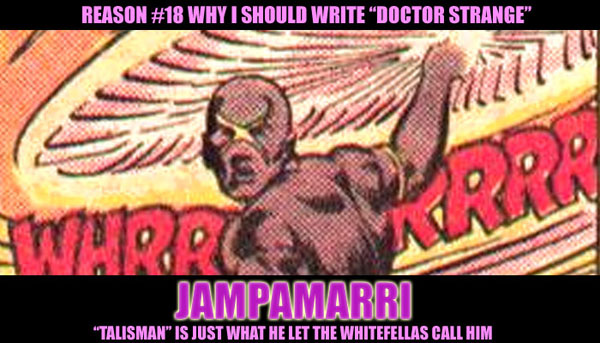
In the old time Baiame the Sky Hero, the first wise man, made the world and all people and taught the Aborigines the magic of the Dream. In the old time Bunjil the Eagle made the world and men (and possibly women, although some credit his wife Bat for the idea) and taught them all the skills they would need to know. In the old time the Rainbow Serpent made the mountains and the waterholes and fought the Sun to create the rain.
All of these stories are true, and resolving the contradictions (well, not actually resolving, but…) of the hundreds and hundreds of Aboriginal creation myths and magic stories – all of which are simultaneously true thanks to the heart of the Dream – is the source of deep, old magic, as old as the Earth itself. Magic that old invites many a person to come along and misuse it – be they white, black, brown, yellow or any other colour (including cyan – it’s a long story). More troubling yet are those who come to exploit Uluru, which is the universe’s Bridge to the World of Waking Dream.
(Some whitefellas call it “the Nexus of all Unrealities,” but that’s only because they called the place in Florida something like that and like names to sound like other names. The two spots really don’t have much to do with one another at all. Well, except when they do, but that’s not often.)
The shamans of the Dreaming People are powerful, but not inclined to combat such things. But there are always a few sorts who aren’t going to be shamans or wizards, and are too clever and observant in the ways of the wider world to be wasted as mere hunters. These men (and very occasionally women) become the hunters-of-sorcerers – those who can travel and manipulate the Dream itself. It’s not magic. Calling it magic is like calling a duck magic because it swims. It’s just something they can do.
Jampamarri is the title of the current man filling this role, a half-Warlpiri in his early thirties. (Or at least he appears to be that old, because that’s how many years ago he was born as we count them. He doesn’t age on his trips into the Dream unless he wants to.) Unlike most of his predecessors, he has a bit of a reputation within the wider world. Well, practically nobody knows him outside of Australia, but at least the non-indigenous peoples know him. He stopped a very bad man one time from doing unpleasant things to a young girl that man had kidnapped, and all Australia called him a superhero (they were very pleased to finally have one), and thanks to a newspaper interviewer not really understanding much of anything he became known as “Talisman,” which didn’t make much sense but he decided it was easier just to let them call him that.
And that’s how it goes for him. He knows the realms of the spirits (like everyone else to do his job, he loves to explore the unreal worlds) like the back of his hand, and knows most of the important political developments in those worlds as well – who’s angry at who, who’s made peace with who, who’s planning to invade Earth, that sort of thing. When Doctor Strange needs advice about traveling into the wider pandimensional realm – the bleeding realms of thought alone which mankind can barely conceive, let alone survive – Jampamarri is always his first stop. And when he needs advice about a foretelling-dream he just had, well, maybe he’ll stop by and ask Jampamarri about that as well.
Because working relationships? Are good things to have.
Top comment: Sorry Blackmage, but my personal canon explanation for why Australia has few superheroes goes like this: Animals with deadly poison. — HittheTargets
"[O]ne of the funniest bloggers on the planet... I only wish he updated more."
-- Popcrunch.com
"By MightyGodKing, we mean sexiest blog in western civilization."
-- Jenn
